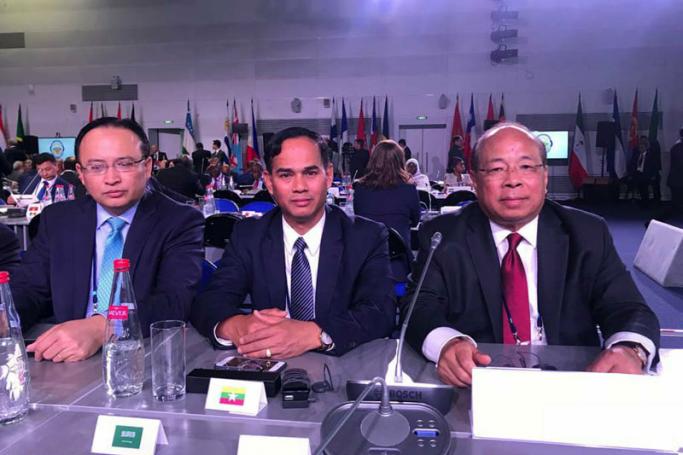Myanmar Union Minister for the Office of the Union Government and National Security Advisor U Thaung Tun told an international high-level meeting held in Russia that rising international tensions and security threats are of growing concern.
The Myanmar minister made the statement yesterday at the IX International Meeting of High Level Officials responsible for Security Matters, held in Sochi, Russia. He is also accompanied by the Deputy Minister for Home Affairs.
The Russia-organized two-day Sochi security meeting was attended by prime ministers, aides to presidents, heads of security councils, defense ministers, representatives of security services and law enforcement agencies from 100 countries.
Myanmar National Security Advisor U Thaung Tun stressed in his statement at the event that the world today is facing its most serious security problems in decades. The sharp rise in international tensions in recent years is challenging our ability to cope with the situation.
The following are key points from his statement:
“Non-traditional security threats in many parts of the world are increasingly intertwined with hidden complicating factors.
“Asymmetric warfare, particularly transnational asymmetric terrorism (TAT), using new technologies and tactics, has clearly become a major source of concern to all of us.
“ICT is widely used to disseminate fake news and hate speech to incite the violence and acts of terror.
“There are also instances where the migration of people and the plight of refugees have been used as a tool of asymmetric warfare.
“The challenges and threats we all are facing today arise from many unexpected sources. They are wide in spectrum, complex in nature and transcend boundaries. No country can address these challenges acting by itself alone. Dialogue among nations is essential.
“We must settle our differences by taking a more holistic approach, forging common strategic interests and moving forward to cooperation.
“The practice of ‘naming’, ‘blaming’, and ‘shaming’ of a particular country must be avoided, as it invariably leads to the growth of negative perception and entrenches differences.
“We must, instead, focus on building trust and confidence among us to successfully transform these conflicts to dialogue.”
You are viewing the old site.
Please update your bookmark to https://eng.mizzima.com.
Mizzima Weekly Magazine Issue...
14 December 2023
Spring Revolution Daily News f...
13 December 2023
New UK Burma sanctions welcome...
13 December 2023
Spring Revolution Daily News f...
12 December 2023
Spring Revolution Daily News f...
11 December 2023
Spring Revolution Daily News f...
08 December 2023
Spring Revolution Daily News f...
07 December 2023
Diaspora journalists increasin...
07 December 2023
Malaysia accused of rights abuse for barring activist’s trip












